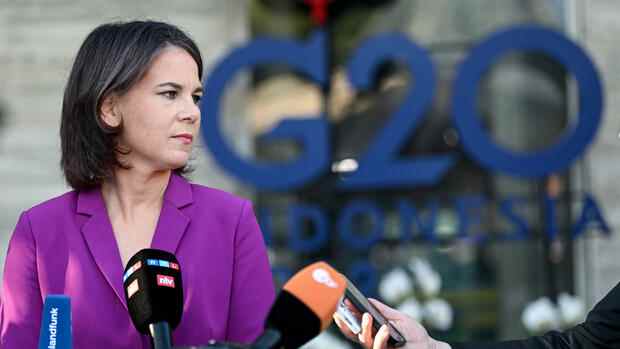Berlin In the end, the controversial guest left earlier than planned. Russian Foreign Minister Sergei Lavrov disappeared after his speech on the Indonesian island of Bali before German Foreign Minister Annalena Baerbock (Greens) could respond to his statements. In his speech, he accused the EU and the US of striving for a victory for Ukraine on the battlefield, which from the Russian point of view prevents a solution to the conflict.
“Then we probably have nothing to discuss with the West,” Lavrov said. He came to Bali to get an impression of “how the West breathes”, he remarked.
There had been many discussions in advance about the presence of the Russian foreign minister at the meeting of the most important industrialized and emerging countries and the EU. Russia remains a member of the G20, largely because China is blocking exclusion. Russia is “an important member and no member has the right to exclude another country,” the Foreign Ministry said in Beijing.
Because of the annexation of Crimea in 2014, however, Russia was excluded from the G7 – formerly G8 – merger.
Top jobs of the day
Find the best jobs now and
be notified by email.
Foreign Minister Baerbock said on her trip to Bali that she was “here as German Foreign Minister together with my European colleagues to make it clear that we are not leaving the international stage to Russia”. With Germany currently chairing the G7, Baerbock could have spoken directly after Lavrov to condemn Russia’s war of aggression in Ukraine. But he decided to avoid the confrontation.
The Russian Foreign Minister made serious accusations against Western countries during his visit to the G20 summit.
(Photo: IMAGO/photothek)
The meeting of foreign ministers, which ends today, is seen as a test for the November summit of G20 leaders at the same venue. Indonesia holds the presidency of the G20 this year. Then, as of now, Russian President Vladimir Putin is also expected in Bali.
The participation of the Russian delegations puts Germany and other Western countries in a dilemma. On the one hand, they wanted to avoid joint photos with Russian representatives against the background of the Ukraine war. Even before the summit began, Foreign Minister Baerbock ruled out shaking Lavrov’s hand: “We’re at an international conference where I can’t smile and stand by someone who is bombing Ukraine at the same time,” she said before leaving.
Struggle for global influence
On the other hand, the G20 is an important format for the European states and the USA in the struggle for global influence. For the German Foreign Ministry, the G20 is an important lever for strengthening relations with important emerging countries – also in competition with Russia and China. Chancellor Olaf Scholz (SPD) has so far left open whether he will travel to the G20 meeting of heads of government in November.
Lavrov met his counterparts from Turkey and China for talks on Thursday. In addition to China, there are other G20 countries that have not yet clearly distanced themselves from Russia, despite the war of aggression in Ukraine.
This includes above all India, which is a member of the G20 and at the same time abstained from the UN General Assembly resolution condemning Russia’s war of aggression. In May, India massively increased imports of Russian oil. The country also gets most of its arms supplies from Russia.
>> Also read here: The federal government is working on a new China strategy – these guidelines have been leaked
International formats such as the G20 meetings are also important for Germany and Europe to counter the Russian narrative that Western sanctions are to blame for the massive rise in energy and food prices. Countries in the Global South are suffering the most from the price increases. Baerbock therefore emphasized in Bali that the G7 countries would “do everything to ensure that the consequences do not affect the poorest in the world, even if we did not cause this war”.
A hunger crisis is also looming on the African continent because of the blockade of the Ukrainian port of Odessa. The Russian foreign minister had agreed to negotiations with Ukraine on grain exports. However, it is unclear when such talks could take place. Attempts to negotiate have so far failed.
Ukraine fears that it will not be able to rely on Russian security guarantees if it clears the sea mines off the port of Odessa to export the wheat. In addition, from a logistical and insurance point of view, it is unclear who would be willing to transport the goods at risk.
More: The insidious poison of the sanctions: “Russia is becoming the backyard of the global economy”
